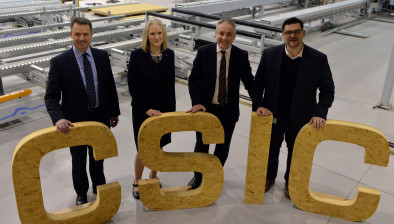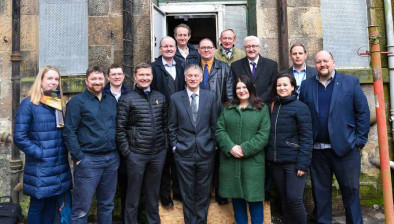First projects win funding from Construction Scotland Innovation Centre
 A proposal for the UK’s first patented prefabricated timber frame party wall system is one of the first six innovation projects to be approved by Construction Scotland Innovation Centre’s (CSIC) Technical Advisory Group of industry and academic experts.
A proposal for the UK’s first patented prefabricated timber frame party wall system is one of the first six innovation projects to be approved by Construction Scotland Innovation Centre’s (CSIC) Technical Advisory Group of industry and academic experts.
The new party wall system is the brainchild of Stewart Milne Group, which will receive almost £100,000 of investment by CSIC to help bring the product through the industrial research and development stage and onto the market. Glasgow Caledonian University and Edinburgh Napier University will contribute to product design and performance validation in a laboratory and site environment to analyse the product’s structural, acoustic, fire and thermal performance.
With a total value of over £800,000, the project has also levered £230,000 of government innovation funding from Innovate UK, bringing in additional industry collaborators and expertise.
When the product is fully developed, it should become the first patented prefabricated timber frame party wall system in the UK, with great potential for export. It is expected to contribute to improved whole life performance of buildings with enhanced thermal, acoustic and fire performance as well as ease and speed of installation and cost effectiveness as key benefits.
The project aims to create 24 new jobs at Stewart Milne Group’s Scottish and English production plants, thanks to the creation of two new production lines to manufacture the walls, which can be used in the construction of housing, hotels and student accommodation.
The Construction Scotland Innovation Centre, which was launched in October 2014, was set up to transform the Scottish construction industry by encouraging companies to focus on driving profitable growth through innovation. CSIC provides Scotland’s 31,000+ construction businesses with a ‘one-stop shop’ for accessing a team of academic experts and public support. The Centre is supported by Scottish Funding Council, Scottish Enterprise, Highlands and Islands Enterprise and 12 Scottish university partners.
CSIC’s initial pilot project, sponsored by construction infrastructure client Transport Scotland to evaluate the performance and suitability of a low cost noise barrier system made from recycled tyres, has just completed. Transport Scotland now have further funding in place to continue developing this product, with the eventual aim of running a pilot on the trunk road network in Scotland.
CSIC’s head of business development, Gillian Fleming, said: “We are delighted to support this Stewart Milne Group project, which has the potential to deliver significant economic impact and help put Scotland firmly on the map in leading edge offsite construction.
“Our industry led Technical Advisory Group, which consists of leading figures from the construction sector and experts from our partner universities, have recommended 4 further projects for Board approval that will commence soon. This, coupled with a healthy pipeline of over 40 diverse innovation project enquiries suggests the construction industry in Scotland is ready to innovate and we predict exciting times ahead for our industry.”
Alex Goodfellow, group managing director of Stewart Milne Timber Systems, said: “We’re delighted that CSIC has chosen to support our next innovation and we are looking forward to working to develop a new and exciting product to bring to market to add to our current portfolio of innovative and effective products. The market is growing and the increased interest in timber frame and offsite manufacture demonstrates the value that the industry increasingly places on new and cost effective ways to build.”
Simon Hart, built environment program leader at Innovate UK, said: “The project from Stewart Milne Group was one of the nine winners of our £4m Building Whole Life Performance competition and was scored highly by an independent assessment panel. It is great to see this level of collaborative innovation in construction and we look forward to following the progress.”






















